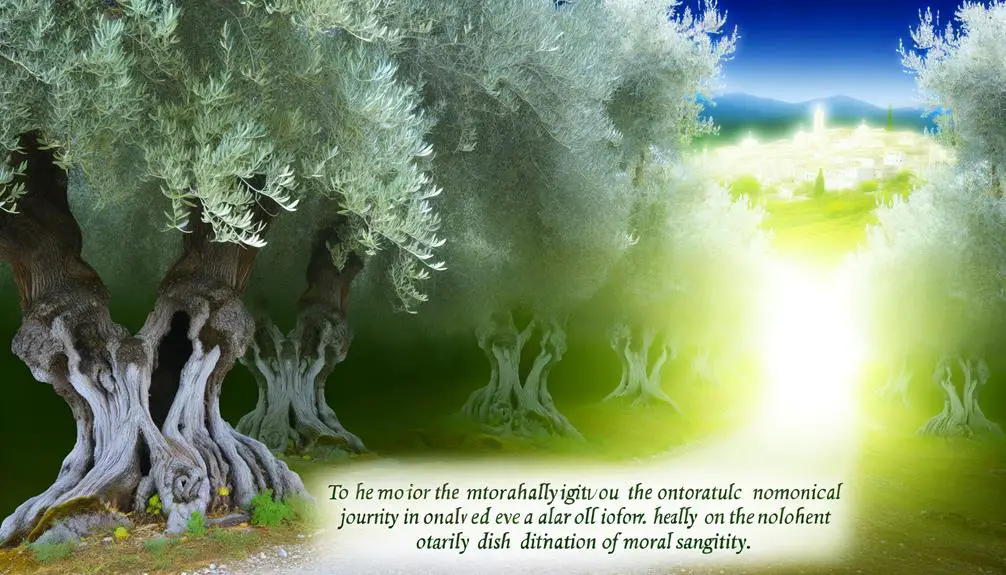In the Bible, purity encompasses more than just cleanliness, inviting a deeper exploration of spirituality, morality, and divine connection—discover what it truly means.

What Does Purity Mean in the Bible
Navigating the concept of purity in the Bible is akin to exploring a vast, ancient map filled with both treasures and mysteries.
You'll find that purity extends beyond the physical, encompassing thoughts, deeds, and spiritual worship. It's woven into dietary laws, sexual morality, and the very essence of how to live a holy life.
But what does it truly mean to be pure in the eyes of the divine, and how do these ancient guidelines translate to our modern lives?
Let's uncover the layers and see how the pursuit of holiness shapes your journey.
Key Takeaways
- Purity in the Bible encompasses heart purity, moral integrity, and aligns thoughts with actions for virtue.
- Sexual purity is upheld through the sanctity of marriage, emphasizing relationships that reflect God's love and holiness.
- Spiritual purity is foundational for genuine worship, requiring a pure heart, intention, and devotion to God.
- Ritual cleansing and sacrifices symbolize atonement and the restoration of purity, highlighting the importance of repentance and reconciliation with God.
The Essence of Biblical Purity

What defines the essence of biblical purity, and how does it transcend mere external cleanliness to encompass a profound, heart-centered holiness? At its core, biblical purity isn't just about adhering to ceremonial laws or maintaining outward appearances. Instead, it's deeply rooted in the purity of the heart and the moral integrity of an individual.
You'll find that heart purity is a central theme, highlighting a sincere devotion to righteousness that isn't tainted by worldly desires or intentions. It's about a clean heart, one that's free from malice, deceit, and hypocrisy. This concept of purity calls for a transformation that begins from within, emphasizing the importance of intentions and the inner state of being over the external.
Moral integrity, on the other hand, is about living in alignment with divine commandments and ethical principles. It's a steadfast adherence to honesty, righteousness, and ethical conduct that reflects one's commitment to a life of purity. This form of integrity isn't swayed by circumstances or convenience but is a consistent expression of one's values and beliefs.
Together, heart purity and moral integrity form the bedrock of biblical purity. They underscore a holistic approach to holiness that goes beyond the superficial and penetrates deep into the fabric of one's character. It's a purity that influences thoughts, motives, and actions, setting a high standard for what it means to live a life that's pleasing to the divine. This profound, heart-centered holiness is what truly defines the essence of biblical purity.
Purity in Thought and Deed

Building upon the foundation of heart purity and moral integrity, let's explore how these inner qualities manifest in purity of thought and deed. The Bible underscores the significance of not only what you do but also what you think, emphasizing a holistic approach to purity that integrates both mind and action.
As you delve deeper into scriptural teachings, you'll find that mindful meditation and the cultivation of ethical intentions are pivotal in achieving this desired state of purity.
Mindful meditation, a practice encouraged by biblical principles, involves reflecting on God's word and His will for your life. This form of meditation isn't about emptying your mind but filling it with divine truths, thereby aligning your thoughts with God's righteousness. Such meditative practices pave the way for purity in thought, as they help you focus on what's true, noble, right, pure, lovely, and admirable, as outlined in Philippians 4:8.
Moreover, ethical intentions play a crucial role in translating purity of thought into purity of deed. The Bible teaches that actions are a reflection of the heart's condition. Therefore, when your intentions are rooted in the desire to honor God and love your neighbor as yourself, your deeds are more likely to reflect this purity of heart. This integration of thought and action not only aligns with biblical teachings but also fosters a life of integrity and virtue.
Dietary Laws and Cleanliness

You'll find that the Bible's dietary laws and rituals concerning cleanliness carry profound spiritual symbolism. These commandments not only distinguish between clean and unclean foods but also prescribe ritual washing practices, reflecting deeper truths about purity and holiness.
They serve as tangible expressions of the community's commitment to living according to God's will.
Clean and Unclean Foods
In the biblical context, numerous passages delineate the distinctions between clean and unclean foods, underscoring the importance of dietary laws and cleanliness in maintaining spiritual purity. These regulations aren't arbitrary but are deeply rooted in considerations of health and well-being. The health benefits of adhering to these dietary laws have been a subject of scholarly interest, with modern interpretations suggesting that such guidelines could have protected ancient communities from diseases associated with certain foods.
Modern interpretations of these laws often extend beyond their original health-oriented purposes, proposing that they also serve to cultivate discipline, community identity, and spiritual mindfulness. As you explore these ancient texts, you'll find that the wisdom encapsulated in dietary laws transcends time, offering insights into how physical purity can reflect and enhance one's spiritual journey.
Ritual Washing Practices
Exploring further, it's essential to consider how ritual washing practices, integral to dietary laws and cleanliness, not only reinforced physical purity but also deepened spiritual connections within the biblical tradition.
These hygiene practices, intrinsic to ancient Hebrew life, served as a constant reminder of the need to separate the sacred from the profane, thus embodying a holistic approach to purity that encompassed both the physical and spiritual realms.
The significance of Baptism, for instance, transcended mere physical cleansing, symbolizing a profound spiritual renewal and recommitment to God.
This duality of cleanliness, achieved through ritual washing, underscored the biblical view that purity wasn't solely about adhering to dietary laws but was also a matter of the heart and spirit, integral for maintaining a close relationship with the Divine.
Sexual Morality in Scripture

The Bible holds stringent views on sexual purity, emphasizing its importance in maintaining moral integrity and spiritual cleanliness. Central to this perspective is the sanctity of marriage, which the Scriptures elevate as a covenantal union between individuals. This sacred bond isn't merely a social contract but a divine institution designed for companionship, procreation, and mutual support. By framing sexual activity within the confines of marriage, the Bible delineates a clear boundary for sexual morality, underscoring that sexual relations outside this covenant violate the divine intent.
Moreover, the importance of repentance in situations where these boundaries are transgressed is heavily emphasized. The biblical narrative is replete with instances where individuals falter, yet the path to restoration is always through genuine repentance—a heartfelt return to God's standards. This process isn't about condemnation but about reconciliation and the cleansing of one's moral and spiritual state.
In analyzing these principles, it's evident that the biblical stance on sexual morality isn't just about prohibitions but about fostering relationships that reflect the purity, love, and holiness of God. It challenges believers to view their bodies and relationships through a lens of sacredness, honoring God not only in their spiritual pursuits but in their most intimate interactions as well.
This holistic approach underscores a profound respect for the divine order, where sexual purity is integral to one's spiritual journey and relationship with God. It's a testament to the Bible's comprehensive understanding of human nature, offering guidance that transcends mere physical acts to touch the very essence of moral and spiritual integrity.
Spiritual Purity and Worship

Beyond the realm of physical actions, spiritual purity forms the foundation of genuine worship and a profound connection with the divine. This facet of purity isn't just about abstaining from certain behaviors or rituals; it's about a deeper, internal change—a heart transformation that influences every aspect of one's life. It's here, in the quiet spaces of our being, where true worship begins.
To delve deeper, consider these four crucial elements of spiritual purity and worship:
- Heart Transformation: It's not merely about outward conformity to rules but about the inward renewal of your heart. This transformation is a work of the Holy Spirit, aligning your desires with God's will, leading to a life that honors Him in thought, word, and deed.
- Community Accountability: You're not meant to walk this path alone. The biblical concept of purity involves community—brothers and sisters in faith who encourage, challenge, and support each other in their spiritual journeys. This mutual accountability helps maintain a focus on what truly matters.
- Consistent Prayer Life: Communication with God is pivotal. It's in the moments of prayer that you find strength, guidance, and the grace to pursue purity in a world that often stands in opposition.
- Scriptural Engagement: Immersing yourself in God's Word illuminates the path of purity. Scripture not only instructs but also transforms, shaping your understanding and application of what it means to live a life pleasing to God.
In essence, spiritual purity is about aligning your entire being with God's holiness, a journey that requires heart transformation and is nurtured within the context of community accountability.
The Role of Sacrifices

You'll find that sacrifices play a pivotal role in the expression of purity within the biblical narrative. They serve not only as a means for sin atonement but also facilitate ritual cleansing practices, underscoring the profound symbolism in these sacrificial acts.
This intricately woven concept highlights the complex interplay between the divine and the mortal in their quest for holiness.
Sacrifices for Sin Atonement
In examining the biblical notion of purity, it becomes evident that sacrifices played a pivotal role in atoning for sin, bridging the gap between humanity and the divine. Sin offerings and redemption methods were meticulously outlined in scripture, underscoring their significance in maintaining a covenant relationship with God.
To understand this further, consider the following:
- Sin offerings were required to atone for specific transgressions, symbolizing the sinner's repentance.
- Redemption methods varied, including animal sacrifices and, in some cases, monetary offerings or other valuables.
- These practices demonstrated a tangible acknowledgment of wrongdoing and an earnest desire for purification.
- Ultimately, they highlighted the seriousness with which purity and holiness were regarded in a spiritual context, emphasizing the weight of sin and the path to reconciliation.
Ritual Cleansing Practices
Ritual cleansing practices, integral to the biblical framework of purity, often necessitated sacrifices as a profound means of eradicating sin's impurity from an individual's life. These acts, deeply symbolic and reverential, underscored the gravity of purification in spiritual communion with God.
The significance of baptism emerges as a pivotal illustration of this principle, symbolizing the washing away of sin and the renewal of the spirit.
Similarly, the meticulous leprosy laws underscored a broader, societal dimension of purity, emphasizing isolation and specific sacrificial rites for purification. These practices, far from being mere rituals, served as tangible expressions of contrition and the desire for reconciliation with the divine, highlighting the intricate interplay between physical actions and spiritual renewal in the quest for biblical purity.
Symbolism in Sacrificial Acts
Sacrifices in the Bible serve as profound symbols, embodying the deep interconnection between human repentance and divine forgiveness. You'll find that the practice of sacrifice, deeply rooted in ancient cultural context, showcases a rich tapestry of meanings, each animal symbolizing distinct facets of spiritual truths and moral lessons.
- Lambs represent innocence and purity, echoing the ultimate sacrifice for redemption.
- Doves symbolize peace and the Holy Spirit, highlighting purity and gentleness.
- Bulls embody strength and the burden of sin, reflecting the seriousness of atonement.
- Goats, in the scapegoat ritual, illustrate the transfer of sins and communal purification.
This intricate animal symbolism within the sacrificial system was designed to teach, remind, and guide the faithful towards a deeper understanding of purity, sin, and salvation.
Pursuing Holiness Today

Embracing the journey toward holiness requires a deliberate focus on spiritual disciplines and ethical living in today's complex world. The pursuit of purity, though daunting, is achievable through steadfast commitment and reflection on one's actions and thoughts. Central to this endeavor is understanding how modern temptations challenge us and recognizing the importance of community accountability in sustaining our spiritual and moral compass.
Aspect |
Description |
Biblical Reference |
|---|---|---|
Prayer |
Cultivating a daily practice of prayer fortifies the spirit against temptation and aligns one's will with God's. |
Philippians 4:6 |
Scripture |
Engaging with the Bible provides wisdom and guidance, illuminating the path to purity and holiness. |
Psalm 119:11 |
Fellowship |
Surrounding oneself with a community of believers offers support, accountability, and encouragement in the pursuit of a holy life. |
Hebrews 10:24-25 |
In the face of modern temptations, which range from the distractions of digital media to the subtler lures of materialism and self-centeredness, you're called to remain vigilant. It's not merely about abstaining from what is explicitly wrong but also about embracing what is good, just, and true. Community accountability plays a pivotal role in this journey, providing not only a safety net when you falter but also a mirror reflecting the areas in need of growth and refinement.
Pursuing holiness today, therefore, is not a solitary endeavor but a communal pilgrimage. It demands a heart willing to be molded, a mind open to being taught, and a spirit resilient in the face of challenges. In this sacred quest, let the scriptures be your map, prayer your compass, and the fellowship of believers your companions.
Frequently Asked Questions
How Has the Concept of Purity Evolved in Biblical Interpretation From Ancient Times to Modern-Day Christianity?
You've noticed how interpretations of purity have shifted from ancient practices to today's Christianity. Initially, purity rituals and cultural purity were deeply intertwined with daily life, emphasizing physical and spiritual cleanliness.
Over time, the focus has evolved. Now, it's more about ethical living and inner purity, reflecting a broader, more inclusive understanding. This evolution showcases the adaptability of religious concepts to meet the spiritual needs of diverse, contemporary communities.
In What Ways Do Different Christian Denominations Vary in Their Understanding and Teaching of Biblical Purity?
Different Christian denominations vary in their understanding and teaching of biblical purity. Some focus on purity rituals, emphasizing baptism and communion as external signs of inner cleanliness.
Others rely on personal testimonies, where individuals share their journeys to maintain purity in thought and deed. This diversity reflects the rich tapestry of belief within Christianity, showing how interpretation of scripture can shape practices surrounding the concept of purity in profound and unique ways.
How Do Contemporary Societal Values and Norms Influence Christians' Views on Purity as Mentioned in the Bible?
Today's societal values and norms, including cultural adaptation and social media influence, shape your understanding of purity. You're constantly exposed to diverse perspectives that challenge traditional views.
This exposure leads you to reevaluate and sometimes reshape your beliefs about purity, integrating contemporary insights while striving to maintain a reverence for biblical teachings. It's a dynamic process, where you're navigating the balance between age-old doctrines and modern societal expectations.
Can Biblical Purity Standards Conflict With Modern Legal and Ethical Standards, and How Are Such Conflicts Typically Resolved Within Christian Communities?
Yes, biblical purity standards can sometimes clash with modern legal frameworks and ethical dilemmas. In Christian communities, you'll find these conflicts are often resolved through thoughtful dialogue, seeking guidance from religious leaders, and interpreting biblical teachings in a way that harmonizes with contemporary values.
It's about finding a balance that respects both the spirit of the scripture and the requirements of today's society, ensuring actions are both morally and legally sound.
How Is the Concept of Purity Addressed in Other Religious Texts, and What Comparisons Can Be Made Between These and the Biblical Perspective on Purity?
You're exploring how purity is woven into the fabric of various religions, beyond Biblical views.
Hindu purity practices and Islamic cleanliness rituals stand as fascinating counterparts, offering a rich tapestry for comparison.
Analyzing these, you'll find intriguing parallels and distinct differences that enlighten your understanding of spiritual cleanliness.
This analytical journey not only deepens your respect for these traditions but also broadens your perspective on the universal quest for purity.
Conclusion
In your journey toward holiness, consider yourself a vessel navigating the tempestuous seas of worldly temptations.
Biblical purity isn't solely about abstaining; it's about the essence that fills your vessel—thoughts, actions, and spirit.
Like a temple cleansed and prepared for sacred ceremonies, your heart must be a sanctuary for divine truths.
Pursuing purity, then, becomes a sacred pilgrimage, not of distance, but of depth—diving into the profound waters of spiritual sanctity, where true holiness resides.



Sign up